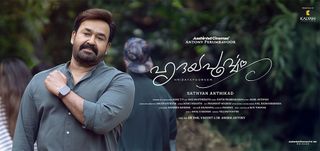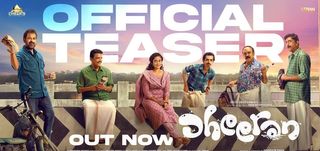
Chalakudykkaran Changathy Movie Review
Taking a leaf out of the eventful life of the late actor Kalabhavan Mani, director Vinayan has created a semi-biopic of the actor in 'Chalakkudikkaran Changathi'. The story written by the filmmaker focuses on the phenomenal rise and unexpected downfall of actor Rajamani aka Mani. The director repeatedly reminds us of the casteism and discrimination in the society and in the filmdom as well. There are interpretations from the part of Vinayan to expose the scheming by a group of people in the industry.
Right from the off, the portrayal of the struggling life of Mani gathers momentum sans any gripping effect and it causes lack of depth in the narration. The pace in the treatment solely helps leave a skin-deep impression on the viewers. Rajamani appears by the same name in the movie as a person, who rose to the pinnacles of cinema from his humble background.
There are fictional elements in the screenplay written by Ummar Muhammed especially in delineating the mystery behind the death of the actor. The peripheral and ordinary treatment gravely affects the movie, which also dwells on the women in the life of Rajamani and his inferiority complex due to his black complexion.
Sudheer Karamana appears as director Hari, who gives several big breaks to Mani in the tinsel world. Mani faces snub from some of his colleagues, including superstar Rajkumar (Joju George). Actress Kavitha (Honey Rose) behaves sympathetically after a bitter introduction between them. Mani is always in tow by his friends, Raju (Vishnu Govind) and Suku (Dharmajan Bolghatty), and manager Vasu (Sreekumar).
It's a sort of emphatic claim from the part of Vinayan regarding the protagonist's virtuous actions in real life and the marginalisation of a prolific talent in the film world. 'Chalakkudikkaran Changathi' largely gives the feel of a lackadaisical visual representation of the controversial events in the life of actor Kalabhavan Mani. On the way, the missing soul in the substance is heavily noticeable.
The room for exuding the mental conflicts and pangs of Kalabhavan Mani is minimal for Rajamani, but he is an apt choice to don the garb of the great artiste. His extreme confidence is palpable in his performance. Bijibal's background score serves the purpose while the folk songs are good enough to reinforce the memories about the actor's singing prowess.
Altogether, it's a loosely crafted package inspired by the life of an amazingly talented artiste. It generates the emotion at the fag-end only after you were made to witness a scattered and soulless drama.



















